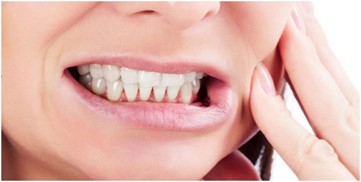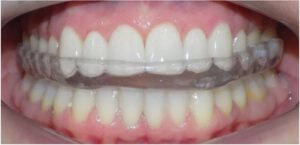Teeth grinding and jaw clenching (bruxism)
Teeth grinding is the forceful sliding of teeth and molars. Jaw clamping is the forceful clenching of teeth. The dental term for both forms is bruxism. Grinding teeth mainly happens at night, while jaw clenching can happen at night as well as during the day. Teeth grinding is common in both young children and adults. In children, it can disappear spontaneously. Usually teeth grinding or jaw clenching is harmless, but it can cause problems, such as tooth wear, fracture of fillings, jaw complaints and enlargement of the chewing muscles.

Cause of teeth grinding and jaw clenching
The exact cause of teeth grinding and jaw clenching is difficult to determine. Sleep disturbances, stress, alcohol use, smoking, certain medicines and drugs (eg Ecstasy) are associated with grinding and clenching. There are also indications that the central nervous system (in Parkinson's disease or Huntington's disease, for example) influences the activity of the chewing muscles at night. There is often no single clear cause; usually several factors play a role.
Teeth Grinding and Jaw Clamping Diagnosis
To diagnose the problem, go to your dentist. This checks whether the jaw clenching and teeth grinding has adverse effects on your teeth. Your partner or relatives can indicate whether you are also grinding at night. Always pass this on to your dentist. He or she also asks about factors that could be the cause of the grinding (eg stress, alcohol use, smoking, general health, medicines). In addition, your dentist inspects the face, oral cavity and teeth. He/she mainly looks at the presence of wear and impressions of the molars in the cheek and tongue; these are indirect signs for creaks and clenches.
To actually diagnose teeth grinding, a sleep study should be performed. During sleep, special equipment is used to record muscle tension in the chewing muscles, breathing patterns and brain activity. Such an examination can take place in a hospital or in specialized clinics (sleep/wake centres). Due to its difficulty and high cost, sleep research is rarely used, only at the express request of a dental gnathologist.
Treatment of teeth grinding and jaw cramps
Becoming aware of the clenching or grinding is the first step. You can get extra help with this. Your dentist can give some advice and possibly make a bite plate. The bite plate protects against tooth wear and sometimes also causes muscle activity to decrease and the chewing muscles to relax more.
In addition, a jaw physiotherapist can help you with various exercises that reduce clenching and any resulting jaw complaints. If necessary, a psychologist can teach you to deal with stress.
Source: NVGPT
Bite plate (splint)
A bite plate is mainly used in the treatment of some jaw complaints and when there is teeth grinding. In case of jaw complaints, the bite plate helps you to avoid wrong oral habits (for example jaw clenching, nail biting, cheek or lip biting), which can reduce pain in the chewing muscles and jaw joints. When grinding your teeth, the bite plate protects your teeth, so that it prevents continued tooth wear.

Imprint and bite registration of your teeth
To develop a bite plate, your dentist makes dental impressions and a bite registration. A dental technician uses this to tailor the bite plate for you. The bite plate is made of hard, transparent plastic and some metal anchors. The bite plate is used in both the lower jaw and the upper jaw. The plate covers all teeth that are present.
Wearing instructions
The specific wearing instructions (when and for how long you should wear the bite plate) depend on the type of (jaw) complaints and oral habits you have. Your dentist (gnathologist) will inform you about the most suitable wearing method for you.
Jaw complaints
Jaw complaints can come from the chewing muscles or the jaw joint. The most common complaints are:
• Sore or tired chewing muscles.
• Painful jaw joint.
• Limited or crooked mouth opening.
• Jaw out of the bowl.
• Temporomandibular joint noises (jaw snapping or grinding noises).
These complaints can lead to limitations in daily activities, such as difficulty chewing, talking or yawning. Jaw complaints and their consequences can cause problems at work, in the family or social life. The dentist can recognize jaw complaints and treat them if necessary. He/she can also refer you to a dental gnathologist.
Cause of jaw complaints
Jaw complaints are often caused or maintained by overload of the chewing muscles and the temporomandibular joint. Wrong oral habits play a major role in this: for example, the habit of clenching the teeth or grinding the teeth of the lower jaw against those of the upper jaw (grinding teeth), which mainly occurs at night. Stress also has an influence: the complaints can increase in a prolonged stress situation. Sometimes an accident, such as a fall on the jaw, can be the cause of jaw complaints. Systemic diseases (diseases in which the whole body is affected), such as rheumatism, osteoarthritis (joint wear and tear) or fibromyalgia (pain in connective tissue and muscles) can also underlie the complaints.
Diagnosis of jaw complaints
In order to make a correct diagnosis, the dentist carries out an extensive functional examination. He/she asks about the nature, pattern, origin and duration of your complaints. Your face, oral cavity and teeth will also be inspected. Your jaw range of motion and movement pattern are assessed and measured; the presence of temporomandibular joint sounds is established. In case of pain, the dentist will also check whether you experience pain with certain jaw movements.
It is often necessary to make an additional X-ray, usually a so-called orthopantomogram, a panoramic photo that shows both jaws and the jaw heads. In addition, your dentist often uses questionnaires to map out your general health and to record the extent to which your complaints hinder you.
Treatment of jaw complaints
The treatment starts with an explanation and instruction of what you can do yourself to reduce the complaints. Treatment of jaw complaints can be done with the help of a bite plate. This is prescribed for pain complaints, limited mouth opening and when there are incorrect oral habits (eg jaw clenching and teeth grinding). Jaw physiotherapy (orofacial physiotherapy) is also commonly practiced. In that case, the dentist will refer you to a specialized orofacial physiotherapist (www.nvof.nl). The dentist (gnathologist) can prescribe exercise therapy.
Sometimes the dentist (gnathologist) prescribes medication: for very recent (acute) pain complaints, painkillers, such as paracetamol and ibuprofen, or in case of a limited mouth opening due to muscle cramps, muscle relaxants, such as Valium. Before prescribing the medication, you must inform the dentist (gnathologist) about your general health and any medication use. Prescribing medicines is usually done in consultation with your GP. In the case of chronic (pain) complaints, a psychologist can be involved in the treatment.
Instructions and advice for jaw complaints
The treatment of jaw complaints always starts with an explanation of the nature, cause and prognosis of these complaints and instructions are given about what you can do yourself to reduce them. The instructions differ depending on the specific diagnosis and cause of the complaint and usually focus on mouth and chewing habits. The most frequently given instructions are:
• Limit bad oral habits, such as jaw clenching, nail biting or chewing gum excessively, especially in situations of tension and stress.
• Avoid chewing tough and hard things.
• Chew the painful side for a while in case of unilateral pain from the temporomandibular joint.
Source: KNMT, Allesoverhetgebit.nl
Come visit us!
- info@mondzorg-valerius.nl
- +31 0 70 870 1466
- Valeriusstraat 25, 2517 HM The Hague